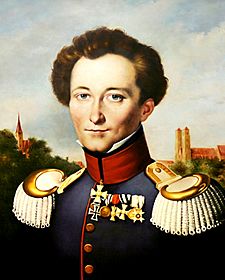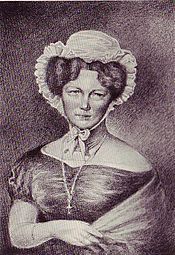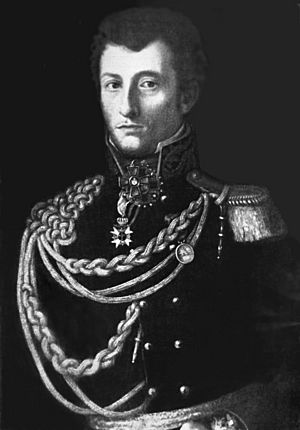Carl von Clausewitz facts for kids
Quick facts for kids
Carl Philipp Gottfried von Clausewitz
|
|
|---|---|

Clausewitz while in Prussian service
|
|
| Born | 1 June 1780 Burg bei Magdeburg, Kingdom of Prussia, Holy Roman Empire |
| Died | 16 November 1831 (aged 51) Breslau, Province of Silesia, Kingdom of Prussia (present-day Wrocław, Lower Silesian Voivodeship, Poland) |
| Allegiance | Prussia Russian Empire (1812–1813) |
| Service/ |
Prussian Army |
| Years of service | 1792–1831 |
| Rank | Major general |
| Unit | Russian–German Legion (III Corps) |
| Commands held | Kriegsakademie |
| Battles/wars | French Revolutionary Wars |
Carl Philipp Gottfried von Clausewitz (1780–1831) was a Prussian general and a very important military thinker. He is famous for his book "On War" (in German, Vom Kriege). Even though he didn't finish it before he died, it's still one of the most important books about military strategy.
Clausewitz believed that war wasn't just about fighting. He thought it was also about the "moral" (meaning psychological) and political reasons behind it. He saw war as a way for countries to continue their politics, just using different methods. His most famous quote is: "War is the continuation of policy with other means."
Contents
Carl von Clausewitz: Early Life and Military Career
Carl von Clausewitz was born on June 1, 1780, in Burg bei Magdeburg, Prussia. His family claimed to be noble, and Carl believed this. His father had been an officer in the army of Frederick the Great.
Carl joined the Prussian army when he was just 12 years old. He started as a lance corporal, which is a low rank. He eventually became a major general.
Fighting in Major Wars
Clausewitz fought in the French Revolutionary Wars from 1793 to 1794. This included the siege of Mainz, when the Prussian army went into France. He also fought in the Napoleonic Wars from 1806 to 1815.
In 1801, at age 21, he joined the Kriegsakademie in Berlin. This was a military academy. There, he impressed General Gerhard von Scharnhorst, who later became the chief-of-staff of the Prussian Army. Clausewitz helped Scharnhorst reform the Prussian army between 1807 and 1814.
Captured by Napoleon
During the Battle of Jena–Auerstedt in 1806, Napoleon's army defeated the Prussian army. Clausewitz was captured along with many other soldiers. He was held prisoner in France for about a year.
After returning to Prussia, he continued to help reform the army. He even wrote a letter about a book on Niccolò Machiavelli, a famous Italian writer.
Marriage and Russian Service
In 1810, Clausewitz married Marie von Brühl. She came from a noble German family and was well-educated. Marie was very important to his career and helped him develop his ideas. After he died, she edited and published his famous book, On War.
Clausewitz did not agree with Prussia's alliance with Napoleon. So, he left the Prussian army in 1812. He then joined the Imperial Russian Army and fought against Napoleon during the Russian campaign. He took part in the Battle of Borodino. He later joined the Russian–German Legion in 1813.
He helped negotiate the Convention of Tauroggen in 1812. This agreement helped Prussia, Russia, and the United Kingdom form a team that eventually defeated Napoleon.
Return to Prussia and Final Years
In 1815, Clausewitz rejoined the Prussian army as a colonel. He became chief-of-staff for the III Corps. He fought in the Battle of Ligny and the Battle of Wavre during the Waterloo campaign in 1815.
Napoleon's army defeated the Prussians at Ligny. But the Prussians retreated in an organized way. This meant they could still fight. Their arrival later at the Battle of Waterloo helped defeat Napoleon. Clausewitz's unit fought hard at Wavre, stopping more French soldiers from reaching Napoleon at Waterloo.
After the war, Clausewitz became the director of the Kriegsakademie until 1830. He returned to active duty when revolutions broke out in Europe. He was sent to the Polish border. His commander died of cholera, a serious disease. Clausewitz himself died of cholera shortly after, on November 17, 1831.
His wife, Marie, published his main work, On War, in 1832. She also wrote the introduction.
Clausewitz's Ideas on War
Clausewitz was a soldier who fought in many battles. But he is most famous for his deep thoughts about war. He wrote a detailed, philosophical book called On War. He used the wars of Frederick the Great and Napoleon to help him understand war better.
His book was unfinished and had parts written at different times. This means some ideas might seem to contradict each other. But many of these are just different sides of his way of thinking. He kept trying to improve the book, especially to include ideas about "people's war" and other types of conflict.
Why His Work is Still Important
Clausewitz's work is still studied today by military leaders and thinkers. His rival from the 19th century, Antoine-Henri Jomini, is not as influential anymore. One historian said Jomini created a "system of war," while Clausewitz created a "philosophy." Systems can become outdated, but philosophies can still be relevant.
Clausewitz tried to define war. One of his definitions is: "War is thus an act of force to compel our enemy to do our will." Another famous one is: "War is merely the continuation of policy with other means."
He also described war as a "fascinating trinity." This trinity has three parts:
- Strong feelings like violence, hatred, and anger (like a blind natural force).
- Chance and probability, where unexpected things happen.
- War as a tool of policy, guided by reason.
This trinity is often simplified to "violent emotion/chance/rational calculation."
War as a Social and Political Event
Clausewitz brought deep philosophical thinking into Western military ideas. He used his own experiences, writings about Napoleon, and historical research. He saw all wars as a mix of decisions, actions, and reactions in a risky and uncertain situation. He also saw war as a social and political event.
He stressed that war is complex. It involves both social and political factors, as well as military actions. He believed that the main goal of war is always linked to a country's political goals.
Key Ideas from On War
Here are some of the main ideas from his book On War:
- Thinking about war from different angles: Looking at military problems from many sides.
- "Critical analysis": Carefully studying military events.
- Politics and military goals: How a country's political aims affect its military aims in war.
- Attack vs. Defense: The idea that defending is often stronger than attacking.
- "Military genius": The special qualities (intelligence, experience, personality) that make a great military leader.
- The "fascinating trinity": The three parts of war (violence, chance, and policy).
- Different kinds of war: Ideas about "absolute war" (ideal, total war) versus "real war" (what actually happens).
- War as a social activity: War is more like an art or a social event than a pure science.
- Importance of "moral forces": Things like courage, spirit, and determination are very important, not just numbers of soldiers.
- Unpredictability of war: War is full of surprises.
- "Fog of war": The confusion and uncertainty that happens during battle. It's hard to know exactly what's going on.
- "Friction": The difference between how things are planned and how they actually happen in war.
- "Center of gravity": The main source of an enemy's power or strength.
- "Culminating point": The point where an attack can no longer continue successfully.
Clausewitz's Influence on Military Thought
Even though he didn't finish Vom Kriege, Clausewitz's ideas have greatly influenced military thinking, especially in Germany. Later German generals, like Helmuth von Moltke the Elder, were clearly inspired by him. Moltke's famous quote, "No operational plan extends with high certainty beyond the first encounter with the main enemy force," shows Clausewitz's ideas about chance and uncertainty in war.
His ideas also spread to British military thinkers. After Britain's struggles in the Boer War (1899–1902), people started paying more attention to Clausewitz.
Influence on Communism
Clausewitz also influenced important communist leaders like Karl Marx, Friedrich Engels, Vladimir Lenin, and Mao Zedong. Lenin admired Clausewitz and called him "one of the great military writers." Because of this, Clausewitz's ideas had a huge impact on the Red Army in Russia.
Mao Zedong, the leader of China, read On War in 1938 and even held a seminar about it. So, many of Mao's writings show Clausewitz's influence.
Modern Impact
The idea that war has "friction" (things going wrong or not as planned) has become common in other areas like business strategy and sports. The phrase "fog of war" comes from Clausewitz's emphasis on how confusing war can be. The term "center of gravity" in a military sense also comes from Clausewitz.
Nuclear Age and Beyond
In the 1950s, the United States' strategy of deterrence (stopping war by showing strength) was inspired by President Dwight D. Eisenhower's reading of Clausewitz. Eisenhower saw Clausewitz's idea of an "absolute war" (a total, destructive war) as a warning. With nuclear weapons, this theoretical idea became a real and terrifying possibility. Eisenhower believed that showing how terrible a nuclear war would be could stop countries from starting one.
Some thinkers in the late 20th century argued that nuclear weapons made Clausewitz's ideas old-fashioned. They said that nuclear powers would use diplomacy or smaller wars, not direct nuclear conflict.
However, Clausewitz didn't just focus on wars between countries with big armies. He also wrote about "small wars," rebellions, and violence by groups that weren't official armies. He studied uprisings and even suggested a "Spanish war in Germany" (guerrilla warfare) against Napoleon. His book includes a chapter on "The People in Arms," showing his interest in how regular people could fight.
Today, Clausewitz's book Vom Kriege is often required reading in military academies and universities around the world.
See also
 In Spanish: Carl von Clausewitz para niños
In Spanish: Carl von Clausewitz para niños
- August Otto Rühle von Lilienstern
- Famous military writers
- Niccolò Machiavelli – The Prince
- Antoine-Henri Jomini
- B.H. Liddell Hart
- John Keegan
- Sun Tzu
- Martin van Creveld
- Absolute war
- Operation Clausewitz
- Philosophy of war
- Principles of War
- Strategic studies
- Total war
- U.S. Army Strategist
Images for kids




